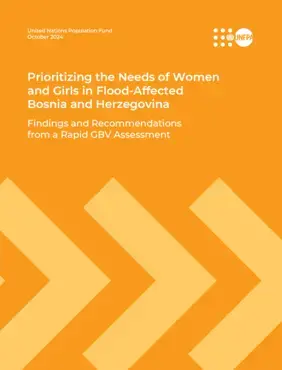The devastating floods and landslides that struck Bosnia and Herzegovina on October 4th, 2024 left a trail of destruction, claiming lives, displacing communities, and shattering livelihoods. While the immediate impact of these natural disasters is readily apparent in the shattered landscapes and disrupted lives, it is crucial to recognize the less visible, yet equally profound, consequences that unfold in the shadows, particularly for vulnerable populations such as women and girls who often bear a disproportionate burden in times of crisis. This report presents the findings of a rapid gender-based violence (GBV) assessment conducted in flood-affected communities in Bosnia and Herzegovina. The assessment aimed to understand the unique challenges faced by women and girls in the aftermath of the disaster, identify their immediate and long-term needs, and provide recommendations for targeted interventions to ensure their safety, well-being, and recovery.
The assessment, conducted from October 25-27, 2024, focused on two municipalities severely impacted by the floods: Konjic and Jablanica. Within these municipalities, the assessment team visited the municipal centers as well as the more remote and heavily affected areas of Butrovic Polje and Donja Jablanica. Through a mixed-methods approach, including a GBV Safety Audit, a general GBV rapid assessment, and focus group discussions with affected women and community volunteers, the assessment team gathered critical information on the availability and accessibility of services, GBV risks and vulnerabilities, and the specific needs of women and girls.
This report provides a comprehensive overview of the key findings, highlighting the challenges, gaps, and opportunities for intervention in the flood-affected communities. It also outlines a set of prioritized recommendations aimed at strengthening services, empowering women and girls, improving information and access, and advocating for policy change to ensure a survivor-centered and gender-responsive approach to recovery. The findings and recommendations presented in this report are intended to inform and guide the humanitarian response, ensuring that the needs of women and girls are prioritized and that they are meaningfully involved in the recovery and rebuilding process.
Both Konjic and Jablanica municipalities in Bosnia and Herzegovina suffered significant damage from recent floods. Konjic municipality saw damage to road infrastructure and fatalities in Buturović Polje, though the municipal center remains functional. While key infrastructure in Buturović Polje is intact and recovery efforts are underway, the village experienced 5 fatalities and extensive damage to homes. In Jablanica municipality, Donja Jablanica was particularly hard-hit with 19 fatalities and catastrophic damage to homes and infrastructure. Although the municipal center is functional, access to Donja Jablanica remains challenging and wastewater management is a critical issue. In both municipalities, the Centers for Social Welfare are operational and providing support to displaced residents.



